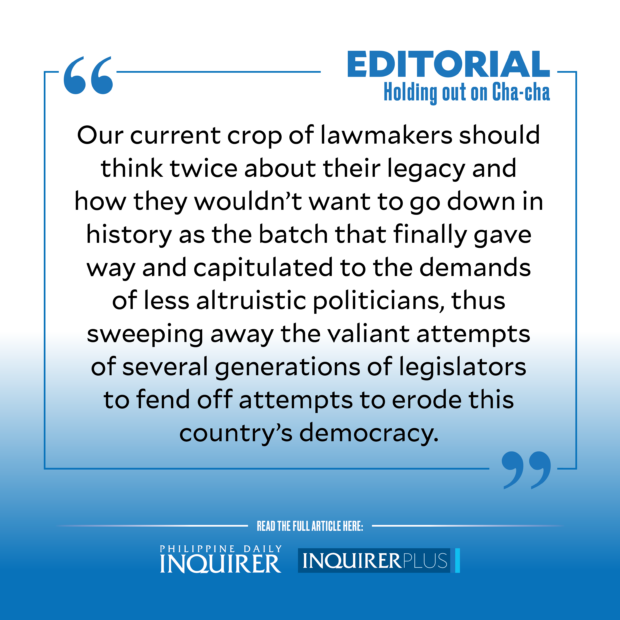
For one, there is the long-running debate on the most appropriate form of government for the Philippines, with proponents of the parliamentary system making a good case for shifting away from our current US-style presidential system and bicameral legislature.
There is also a clamor to revisit provisions of the basic law on the term limits of elective officials and how they are insufficient to prevent, and may even encourage, the formation and perpetuation of political dynasties.
There is even that short innocuous line in Article II, Section 3 or the Declaration of Principles and State Policies which states that the Armed Forces of the Philippines is “the protector of the people and the State”—wording that has been used at various times in the country’s recent history to justify coup d’etat attempts ostensibly to “save” Filipinos from “bad” political leaders.
But the recurring justification among lawmakers in pushing for Charter change (Cha-cha)—the “restrictive” economic provisions of the Constitution—is insufficient reason to expose the country to the risk that political entities behind chosen constitutional convention (con-con) delegates would suddenly succumb to the temptation of injecting self-serving amendments once the chance presents itself.
Just last year, the Public Service Act became law, revealing legislators’ creativity and deft touch in crafting a law that allowed foreigners to own key public utilities in the Philippines—which was expressly prohibited under the 1987 Charter.Similar economic measures were also enacted like the Retail Trade Liberalization Act and the Foreign Investments Act, making it easier for foreign capital to enter the country, create jobs for Filipinos, and hopefully park their profits here as well.
Senate President Juan Miguel Zubiri is correct in pointing out that what deters foreign investors from bringing in their businesses isn’t so much the restrictions in the basic law, but the bureaucratic red tape, corruption, and policy instability faced on a daily basis by big and small businesses operating in the Philippines.
But like a broken record, the issue of Cha-cha has been replayed incessantly by political allies in every administration since the Ramos presidency, and the discussions have invariably come to naught. The effort in its current form is a waste of time, energy, and resources that are better used to address more pressing issues facing Filipinos, like implementing structural reforms to address the record high prices of goods and services, or helping ensure the economy’s recovery from its worst contraction since World War II due to the pandemic.
In all these, the Senate with its national mandate has always played an important role of keeping in check the more insular tendencies of the House of Representatives whose members tend to pander to the more immediate and short-term needs of their constituencies.
Senators should remember that they are the last line of defense of the Filipino people in ensuring that the country’s current form of democracy—rambunctious and dysfunctional as it may be in many ways—does not become an instrument used by unscrupulous political leaders to perpetuate themselves in power.
Our current crop of lawmakers should think twice about their legacy and how they wouldn’t want to go down in history as the batch that finally gave way and capitulated to the demands of less altruistic politicians, thus sweeping away the valiant attempts of several generations of legislators to fend off attempts to erode this country’s democracy.
Make no mistake about it: There are many valid reasons to update the 1987 Constitution. Some of them may be compelling enough to allow our esteemed lawmakers to start the process of improving the law that governs every aspect of Filipino life. But loosening “restrictive” economic provisions by itself alone is insufficient justification. As Zubiri himself pointed out, why not implement the newly enacted laws meant to address the very issues being brought up as rationale for Cha-cha, before going through this rigorous, complicated, and very expensive exercise?
Bulldozing healthy debate on the issue with threats of leaving one’s party as one senator has done, and rushing approval of Cha-cha among constituents with so-called nationwide consultations have only stoked fears that some political leaders are out to extend their terms in office. With the con-con billed as an independent entity, what’s to stop the delegates—with some nudging from political interests—from venturing into provisions beyond the economic restrictions used as an initial volley to kickstart the process? Only by convincing the people that our elected officials aren’t looking out for their own political survival and perpetuity in office can the substantive work on getting badly needed charter amendments begin.
Anything less is nothing more than an illusionist’s sleight-of-hand tricks at a children’s party.